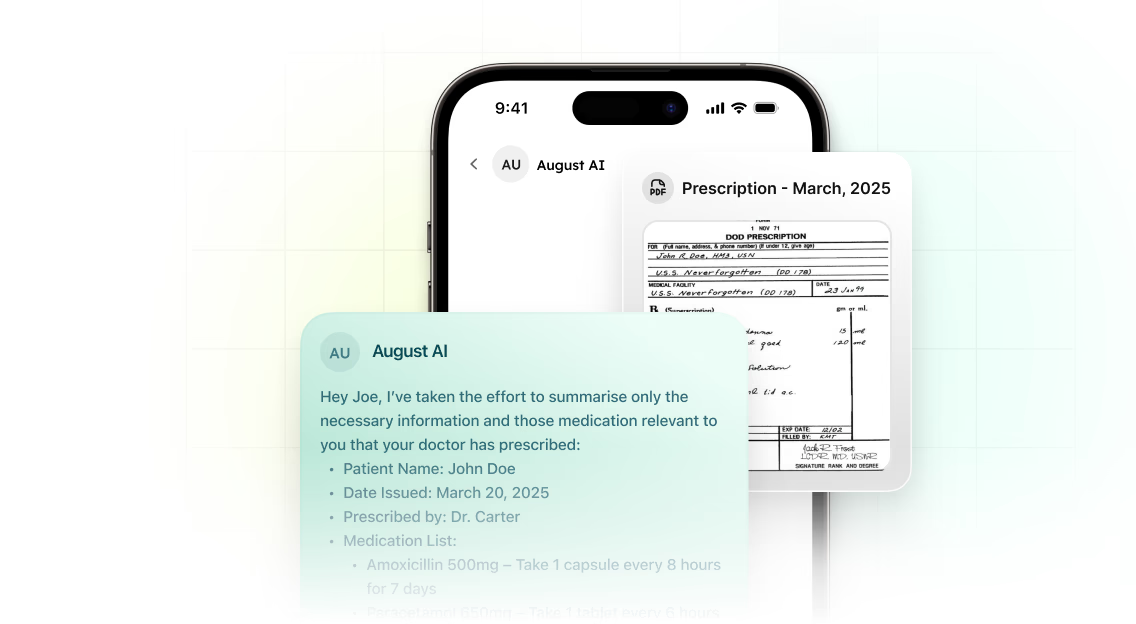August AI Pioneering the Future of Personalized Healthcare with Advanced AI

CHENNAI, INDIA – June 17, 2025 – In an era where artificial intelligence is rapidly reshaping industries, “August AI” is emerging as a significant player, particularly in the healthcare sector. This Bangalore-based health AI startup, known for its innovative approach to personalized health information, is not only outperforming established models like OpenAI’s GPT-4 and Google’s MedPaLM in medical accuracy but is also expanding its reach and refining its technological core. With a focus on democratizing access to high-quality health information, August AI’s trajectory signals a promising future for AI in personalized health.
A Deep Dive into August AI Technological Edge
August AI, developed by a multidisciplinary team of engineers, data scientists, and doctors, stands out for its robust AI health engine. The company’s claims of superior diagnostic accuracy are backed by impressive benchmarks, most notably scoring 94.8% on the US Medical Licensing Examination (USMLE). This remarkable achievement positions August AI ahead of both Google’s MedPaLM 2 (85%) and OpenAI’s GPT-4 (87.8%) in a critical assessment of medical knowledge.
The secret to August AI accuracy lies in its unique architectural approach. Rather than relying on a single large language model (LLM), August AI leverages a “fusion of LLMs” from multiple providers. The company has meticulously experimented with, disassembled, and fine-tuned various models, including BERT, LlaMA, and GPT-4, and more recently, Llama-2, to create its core engine. This ensemble refinement technique, optimized for token efficiency and minimizing hallucinations, allows August AI to provide highly reliable answers to health-related questions.
Furthermore, August AI addresses a critical concern in healthcare AI: bias. The company has actively focused on collecting India-specific data and integrating it into its models to mitigate societal biases often found in clinical decisions, which can be perpetuated by globally trained LLMs. This regional focus ensures more relevant and equitable health information for its target users. The platform is also multimodal, accepting inputs in various formats like audio, text, and PDF lab reports, and delivering clear, actionable text output.
Transforming Healthcare Accessibility and User Experience
August AI mission extends beyond mere accuracy; it aims to simplify and demystify complex health information for the average person. Recognizing the “chaotic silence between visits” to a doctor, August AI functions as a 24/7 AI health assistant. It translates medical jargon, interprets lab reports, highlights crucial information, flags potential medication interactions, and suggests safer alternatives. This is a significant leap forward in empowering individuals to understand their health data and make informed decisions.
A key strategic move for August AI has been its decision to offer its services for free on WhatsApp. This move significantly enhances accessibility, leveraging WhatsApp’s vast global user base of over 2 billion people. The comfort and familiarity users have with WhatsApp make it an ideal platform for August AI to deliver instant, human-like support for various health queries, even at unconventional hours. While an app is in the pipeline, the current WhatsApp-first approach underscores August AI’s commitment to broad accessibility, irrespective of socio-economic status or technical sophistication.
The company emphasizes that August AI is designed as a “health companion AI,” not a replacement for doctors. Its role is to provide clarity and reassurance, helping users piece together information when human healthcare providers may be limited by time or resources. This focus on augmenting, rather than supplanting, traditional medical care positions August AI as a valuable tool in the evolving healthcare ecosystem.
Strategic Growth and Market Position
Founded in 2022, August AI, a private company headquartered in Bengaluru, India, has already attracted investor interest, securing $986K in seed funding in June 2024. This early investment from entities like Claypond Capital Partners and Manipal Global Education Services highlights confidence in August AI’s potential to disrupt the health tech market.
The broader August AI is experiencing exponential growth. Reports indicate that the global AI market is projected to reach an astounding $3.68 trillion by 2034, growing at a compound annual growth rate (CAGR) of 19.20% from 2025. The healthcare sector is a significant driver of this growth, with a burgeoning demand for AI technologies in diagnostics, fraud detection, personalized medicine, and patient care. August AI is well-positioned to capture a substantial share of this expanding market, particularly in regions like North America and Asia, where AI adoption in healthcare is rapidly accelerating.
TCS, a major IT services company, recently underscored the growing importance of AI in cloud and generative AI (GenAI) by splitting its AI.Cloud unit, established in August 2023, into two distinct business units. This strategic restructuring, aimed at higher growth and led by new dedicated heads for AI and Cloud, signals the immense potential and pervasive nature of AI across industries, including healthcare. While not directly related to August AI, it exemplifies the broader industry’s commitment to investing heavily in AI capabilities.
Partnerships and Collaborations Fostering a Collaborative Future
The future of AI often lies in strategic collaborations, and August AI is no exception. While specific recent partnerships for August AI itself are not widely publicized, the broader trend in the AI and healthcare sectors points towards increased collaboration. For instance, AstraZeneca’s recent strategic collaboration with CSPC Pharmaceuticals focuses on AI-enabled research for novel drug discovery, highlighting the power of AI in accelerating medical advancements. Similarly, the concept of “vibe teaming,” as explored by the Brookings Institution, showcases how human-human-AI collaboration can enhance collective intelligence and problem-solving for complex global challenges, including those in healthcare.
These macro trends suggest a fertile ground for August AI to forge partnerships that could further enhance its data sets, integrate with existing healthcare systems, and expand its service offerings. As a company focused on ethical AI and data privacy, any future collaborations would likely prioritize secure and responsible data handling.
The Road Ahead: Challenges and Opportunities
Despite its impressive progress, August AI, like all AI companies, faces challenges. Ensuring the continued accuracy and reliability of its AI as medical knowledge evolves and new data emerges will be paramount. Addressing potential biases, maintaining user trust, and navigating the complex regulatory landscape of healthcare will also be ongoing efforts. The company’s commitment to only providing health information and not medical advice is a crucial distinction that helps manage user expectations and legal liabilities.
However, the opportunities for August AI are vast. The global shift towards digitalization and the increasing demand for accessible, personalized healthcare solutions create a significant market for its services. Further advancements in multimodal AI, including the ability to process more complex visual data from scans and integrate seamlessly with wearable health devices, could unlock new frontiers for August AI. The continued focus on user experience, ensuring that the AI feels “warm, real, and human” rather than “cold, clinical, and generic,” will be key to its sustained success and widespread adoption.
As the world hurtles towards a future deeply integrated with artificial intelligence, August AI is not just a participant; it’s a pioneer. By prioritizing accuracy, accessibility, and a human-centered approach to health information, August AI is poised to play a crucial role in empowering individuals to navigate their health journeys with greater clarity and confidence. The ongoing advancements in AI, coupled with a strategic focus on user needs, suggest a bright and impactful future for August AI in the personalized healthcare revolution.









